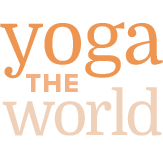Asteya (non-stealing) and privilege
Welcome to October!
I woke up to the rain and wind rustling the trees in the park. I actually love this weather, in large part because I have the privilege to only really be in it when I want to. Most of the time, I can look at it from the safe distance of my living room window, candles lit, blanket on my lap.
It reminded me that we are coming up on a time in the northern hemisphere where living on the edges gets harder, because sleeping rough becomes even less hospitable. Hurricanes, driving rain, ultimately snowstorms, you know what I am talking about.
Yesterday, I went to a training where folks talked about true inclusivity starting at the edges moving towards the center, and not the other way around.
(Bear with me, I swear this is related both to the weather and sleeping rough, and to yoga).
As examples, in concrete terms language inclusivity from the edges would mean hosting any get-togethers in the minority language, so everyone would need to consider whether others understand them, limiting use of jargon and speaking more slowly. And gender inclusivity from the edges would mean making most public bathrooms all-gender, so everyone gets to be respectful and welcoming of others and aware of their gender expression.
This is also yoga.
In the sutra attributed to Patanjali, one of the oldest texts systematizing a particular vision for yoga, five yamas (restraints) are laid out: stuff we shouldn’t do if we want to live in peaceful harmony with each other.
One of these is asteya (non-stealing).
The true meaning of asteya goes beyond not shoplifting, not taking credit for someone else’s work, and not evading paying your share of taxes. Despite being common, these acts of stealing would be relatively easy to correct.
The true meaning of asteya also means contemplating the impact of our privilege (e.g. being a majority language speaker, having a gender expression that is recognizably “male” or female”), and ensuring this privilege does not “steal” space, time, and emotional labor from others.
This is harder to do. But that is the work. And by doing it, we get closer not only to each other, but to our own humanity.
And that’s what yoga is for.

